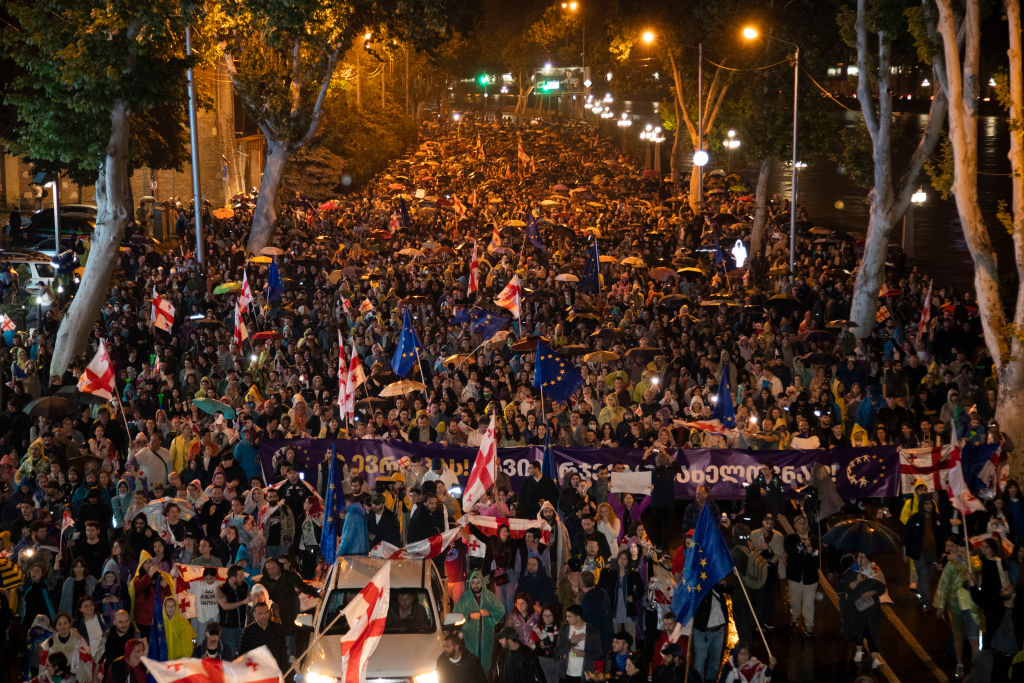
Strategic Snapshot: Autocratization in Georgia
Strategic Snapshot: Autocratization in Georgia
April 2024–September 2025:
Between April 2024 and September 2025, Georgia’s ruling Georgian Dream party enacted illiberal laws, held parliamentary elections marked by voter pressure and Russian manipulation, violently suppressed resulting protests, and suspended EU accession talks. Georgian autocratization triggered Western sanctions and diplomatic fallout as Georgian Dream increasingly aligned with Russia, and to some extent, the People’s Republic of China (PRC). The Georgian Dream government continues to suppress independent media, political opposition, and large swaths of civil society.
Timeline
May 2025–September 2025: Georgian Dream has turned its focus to local elections scheduled for October 4, 2025. It passed legislation in three stages that aim to further rig the electoral system to its advantage. The main opposition has boycotted the upcoming elections, saying that participating would amount to cooperating with the Georgian Dream government and normalizing its rule amid ongoing anti-government protests and state repression. Georgian Dream has vowed to win all municipalities while, for the first time, not inviting the international Office for Democratic Institutions and Human Rights (ODIHR) of the Organization for Security and Co-operation in Europe (OSCE) mission to observe the vote.
Read more:
Georgian Dream Detains Eight Opposition Figures, Khatia Shamanauri (Published July 16, 2025)
Ongoing Civil Protests in Georgia Hope to Create New Political Reality, Zaal Anjaparidze (Published July 15, 2025)
April 1, 2025: Georgian Dream passed the “Foreign Agents Registration Act,” expanding on the “Transparency of Foreign Influence Law” to ban foreign-funded media and require registration for foreign-funded individuals. The law shuttered many independent news outlets since most of them received funding from abroad.
Read more:
Georgian Government Initiates Sweeping Changes in Preparation for Local Elections, Beka Chedia (Published April 15, 2025)
January 29, 2025: Georgia formally withdrew from the Parliamentary Assembly of the Council of Europe (PACE) following a resolution demanding new parliamentary elections and the release of political prisoners.
Read more:
Georgia Leaves Parliamentary Assembly of the Council of Europe, Beka Chedia (Published February 4, 2025)
December 29, 2024: Western diplomats boycotted the inauguration of Mikheil Kavelashvili as Georgia’s new president. Former President Salome Zourabichvili refused to recognize the election and continues to represent Georgia from abroad, claiming to uphold the country’s democratic legitimacy.
Read more:
Georgia Faces Becoming a Pariah State to West, Beka Chedia (Published January 13, 2025)
November 28, 2024: Prime Minister Irakli Kobakhidze announced a suspension of EU accession talks until 2028, citing alleged European interference in October’s parliamentary elections. The move, at odds with the Georgian constitution’s mandate that constitutional bodies pursue EU integration, ignited massive protests that were suppressed by police through mass detentions and violence. The U.S. government responded by suspending its strategic partnership with Georgia and imposing sanctions on Georgian Dream leaders.
Read more:
Georgians Protest Government Decision to Suspend EU Accession, Giorgi Menabde (Published December 6, 2024)
October 26, 2024: Georgia held parliamentary elections. Georgian Dream declared victory with nearly 54 percent of the vote, though opposition parties alleged widespread election fraud and Russian interference. Voter turnout exceeded two million, but irregularities and manipulation were reported, especially in minority-dominated regions. The opposition rejected the results, called for re-elections under international supervision, and mobilized public protests.
Read more:
Georgian Elections Mark Western Geopolitical Defeat and Win for Russian Influence, Beka Chedia (Published October 28, 2024)
April 3, 2024: Georgia’s ruling Georgian Dream party reintroduced the “Transparency of Foreign Influence” law, which would require non-governmental organizations (NGOs) with 20 percent or more foreign funding to register as “agents of external forces,” triggering widespread protests. The law, echoing Russian-style restrictions, was signed into law on June 3, 2024. Tens of thousands of Georgians protested the new law, accusing Georgian Dream of steering the country away from its path to EU membership. Russia praised the law, deepening concerns about Kremlin influence.
Read more:
Public Protests Intensify Against Georgian Dream Foreign Agent Law, Giorgi Menabde (Published April 24, 2024)
Other Trends:
United States–Georgia Relationship Marked by Diverging Interests
March 2025–May 2025: Efforts at a diplomatic reset between the United States and Georgia have faltered. Meetings between Georgian and U.S. officials in March 2025 were strained, and the subsequent passage of the U.S. “Mobilizing and Enhancing Georgia’s Options for Building Accountability, Resilience, and Independence” (MEGOBARI) Act on May 5—legislation that reaffirms support for the Georgian opposition and its Euro-Atlantic integration through sanctions on key Georgian Dream officials—was condemned by Tbilisi. Georgian leaders launched renewed anti-U.S. propaganda and threatened to reduce Western diplomatic presence, including denying entry to EU diplomats. The United States, while reevaluating its strategy, has reaffirmed its support for Georgian democracy and civil society through continued legislative and diplomatic measures.
Read more:
Georgian Dream Condemns U.S. MEGOBARI Act, Beka Chedia (Published June 2, 2025)
Georgian Dream Seeks to Reset U.S.-Georgian Relations, Giorgi Menabde (Published April 9, 2025)
December 2024: The United States sanctioned Georgian billionaire and informal, though immensely powerful, political operator Bidzina Ivanishvili for undermining democratic institutions. The move was welcomed by Georgia’s opposition but sharply criticized by the ruling Georgian Dream party, which framed the sanctions as retaliation for resisting Western influence.
Read more:
Informal Georgian Leader Bidzina Ivanishvili Faces U.S. Sanctions, Giorgi Menabde (Published January 23, 2025)
Georgia–PRC Relationship Deepening
Since 2012, Georgia’s ruling Georgian Dream party has shifted from skepticism to deepening ties with the PRC, culminating in a 2023 strategic partnership agreement. This alliance has expanded free trade, visa-free travel, joint infrastructure projects, and PRC business growth in Georgia. Despite Georgia’s pro-Western public, the government is promoting political and economic cooperation with the PRC as a counterbalance to Western influence. Trade and cooperation with the PRC are growing in sectors like real estate, education, and surveillance, though concerns persist over cybersecurity and the PRC’s lack of support for Georgia’s territorial integrity in the United Nations.
Read more:
Georgia Shifts Eastward Amid Strained Western Ties, Khatia Shamanauri (Published June 10, 2025)
Georgian Dream and the People’s Republic of China Pursue Strategic Relationship, Beka Chedia (Published March 31, 2025)
Increasing Russian Influence and Alignment
As Georgia’s relationship with the European Union and the United States continues to strain, Russia has moved to fill the vacuum. Trade ties, tourism, and Russian business expansion have accelerated since 2024. Despite public denial of formal diplomatic restoration, unofficial Russian–Georgian contacts reportedly increased. Georgian Dream leaders began promoting anti-Western conspiracy theories, blaming a “deep state” and “global war party” for attempting to orchestrate a color revolution in Georgia. Russian media and intelligence services echoed these claims, accusing the United States and European Union of plotting regime change.
Read more:
Georgian Dream Moves Away from NATO Aspirations, Beka Chedia (Published June 18, 2025)
Georgia’s Pro-Kremlin Parties are Growing Stronger, Beka Chedia (Published April 30, 2025)
Russian Intelligence Strategizes to Keep Georgian Dream in Power, Beka Chedia (Published March 12, 2025)
Georgia Remains Target of Attempted Russian Influence, Zaal Anjaparidze (Published March 5, 2025)
See PDF here.
For more Jamestown coverage on Georgia see here.

